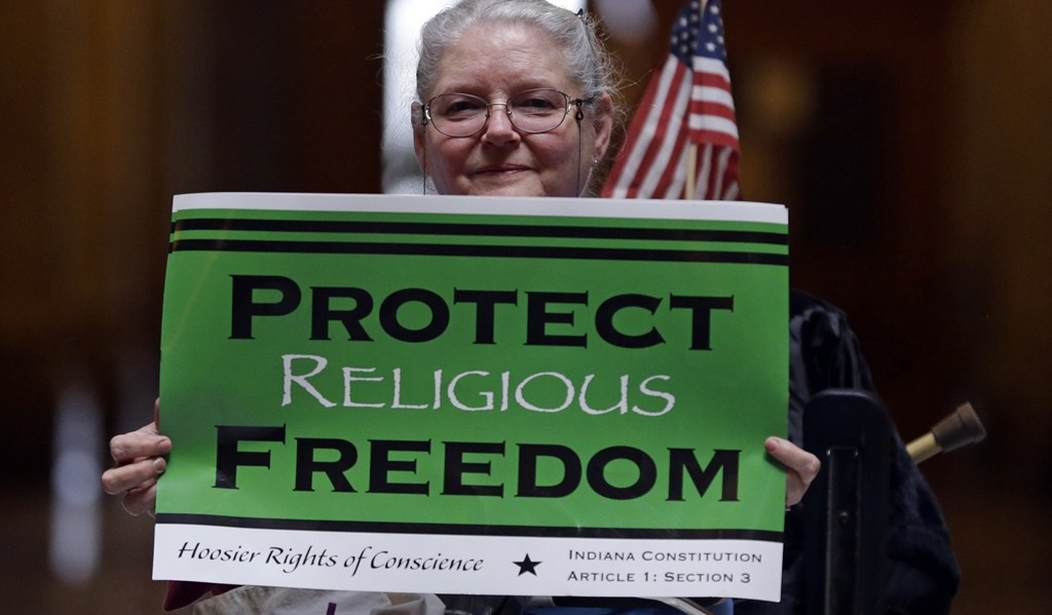The Napa Legal Institute has unveiled its third annual Faith and Freedom Index, a ranking of all 50 states (and Washington D.C.) that aims to highlight "how states can strengthen protections for religious organizations and faith-based nonprofits."
In a Monday webinar, President Mark Rohlena, Senior Counsel and Director of Content Frank DeVito, Board Vice Chairman John Peiffer, and Fr. Tony Pillari discussed the Faith and Freedom Index and its implications for America's religious and charitable organizations.
DeVito noted that the Faith and Freedom Index was especially beneficial to smaller organizations that "struggle with laws that often affect those who don't have the resources to comply with them." He also laid out the parameters of the Faith and Freedom Index, which tries to "be as objective" as possible in looking at state laws. "Some blue states have some good laws on the books," DeVito said, noting those laws "offer some level of protection" for religious freedom. It also provides states that may be more friendly to religious freedom with a roadmap for improving protections.
The Napa Legal Institute breaks down the Faith and Freedom report into two segments: the "Religious Freedom Category," which takes into consideration "State Constitutional Protection of Free Exercise, State Religious Freedom Restoration Act, Religious Freedom for Nonprofits with Public Programming, Religious Freedom for Faith-Based Employers, Protections for Religious Exercise During a State of Emergency, and State Blaine Amendments" and the "Regulatory Freedom Category" which includes "Nonprofit Religious Corporation Law, Standards of Conduct for Directors of Religious Organizations, Charitable Registration Law, Audit Requirements Pursuant to Charitable Registration, Corporate Income Tax, Sales and Use Tax – Sales, Sales and Use Tax – Purchases, and Property Tax."
Recommended
The number one state in this year's ranking is Alabama, with an overall score of 72 percent. Here's why Alabama ranked so high:
Alabama has several laws that facilitate the contributions of faith-based nonprofits, including strong constitutional protections for free exercise of religion, a state constitutional amendment requiring government burdens on religious exercise to satisfy strict scrutiny, and an automatic exemption from state corporate income tax for organizations with federal 501(c)(3) status. Additionally, Alabama does not impose audit requirements as a condition of maintaining authorization to fundraise in the state for those same organizations.
The report notes that the state's Blaine Amendment is "broadly restrictive," however, and an area for improvement. A Blaine Amendment is a constitutional provision that prohibits or limits the use of public funds to support religious institutions.
Fr. Pillari, who is chancellor at St. Martin's Academy in Kansas, said that the Catholic school's ability to "teach in harmony with natural law" could come under attack if not for robust state protections of religious freedom. He noted that state-level Religious Freedom Restoration Acts (RFRAs) are "very helpful" in addressing concerns about religious liberty, as states sometimes seek to override federal First Amendment protections.
Michigan ranks dead last on the report, with an overall score of 31 percent. According to the report, here's what Michigan does wrong:
Michigan has some policies that facilitate the contributions of faith-based nonprofits, including an automatic exemption from state corporate income tax for religious organizations that have 501(c)(3) status. Michigan, however, has several laws that are burdensome to faith-based nonprofits operating in the state, such as a broad Blaine Amendment, nondiscrimination laws regarding public accommodations and employment that include no meaningful exemptions for religious organizations, and a lack of a RFRA.
You can browse the Faith and Freedom Index report and find an interactive map here.
In a press release, the Napa Legal Institute noted some positive shifts since the last report:
Some states have made progress since the last version of the Index was released. For example, Georgia and Wyoming have passed state Religious Freedom Restoration Acts in the last year, providing strong defenses for faith-based nonprofits against laws that conflict with their religious beliefs and practices. Every state that passes a law improving the religious liberty landscape for faith-based nonprofits is a victory for society.
It also provides religious organizations with access to info for faith-based attorneys and creates a network where people of faith can come together to serve one another and their missions:
Through the Good Counselor Project, Napa Legal provides formation to faith-based attorneys, equips them with the skills they need to assist religious organizations, and has created a nationwide network so that faith-based nonprofits and faith-based attorneys can come together and serve each other’s needs.
The Napa Legal Institute's purpose is to provide nonprofits "with the tools and resources they need so they can protect their organizations and achieve their missions," and for states to give these organizations the freedom they need to contribute meaningfully to society.
"Every state has the ability to pass better laws to protect religious organizations and help them thrive," Peiffer said.
Editor’s Note: The Schumer Shutdown is here. Rather than put the American people first, Chuck Schumer and the radical Democrats forced a government shutdown for healthcare for illegals. They own this.
Help us continue to report the truth about the Schumer Shutdown. Use promo code POTUS47 to get 74% off your VIP membership.

























Join the conversation as a VIP Member